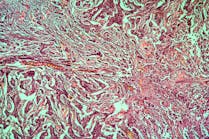A research study led by a multidisciplinary team of scientists at Roswell Park Comprehensive Cancer Center details evidence on the therapeutic efficacy of a compound that targets a key genetic feature of pancreatic cancer.
The work, published in Cancer Research, a journal of the American Association for Cancer Research, illustrates potential clinical applications for the novel anticancer agent MRTX1133 and outlines its effect on both the tumor and the surrounding environment.
Most pancreatic cancers harbor mutations in the KRAS gene, which drives many of the features that make this disease so lethal. New precision agents have been developed that are selective for KRAS mutations. In this new work, the Roswell Park team explores the utility of a selective inhibitor, MRTX1133, that specifically targets KRASG12D — a mutation present in approximately half of all pancreatic cancers.
Mutation of KRAS is a major molecular driver for the development of pancreatic cancer. MRTX1133, being a selective inhibitor against mutant KRASG12D, possesses antitumor efficacy that is selective for only tumor cells that harbor this mutation — a level of precision targeting that has long been a goal for the treatment of cancer. The team used a series of laboratory cell lines and preclinical models to illustrate how the tumor itself, as well as the environment surrounding the tumor, is acted upon by MRTX1133 and how both contribute to the therapeutic response.
Akey finding of the study was that MRTX1133 reprogrammed the immune system despite only inhibiting KRASG12D present in the tumor itself. In this fashion, the immune system contributed to potent therapeutic response in several of the pancreatic cancer models tested.
Roswell Park Comprehensive Cancer Center release on Newswise





